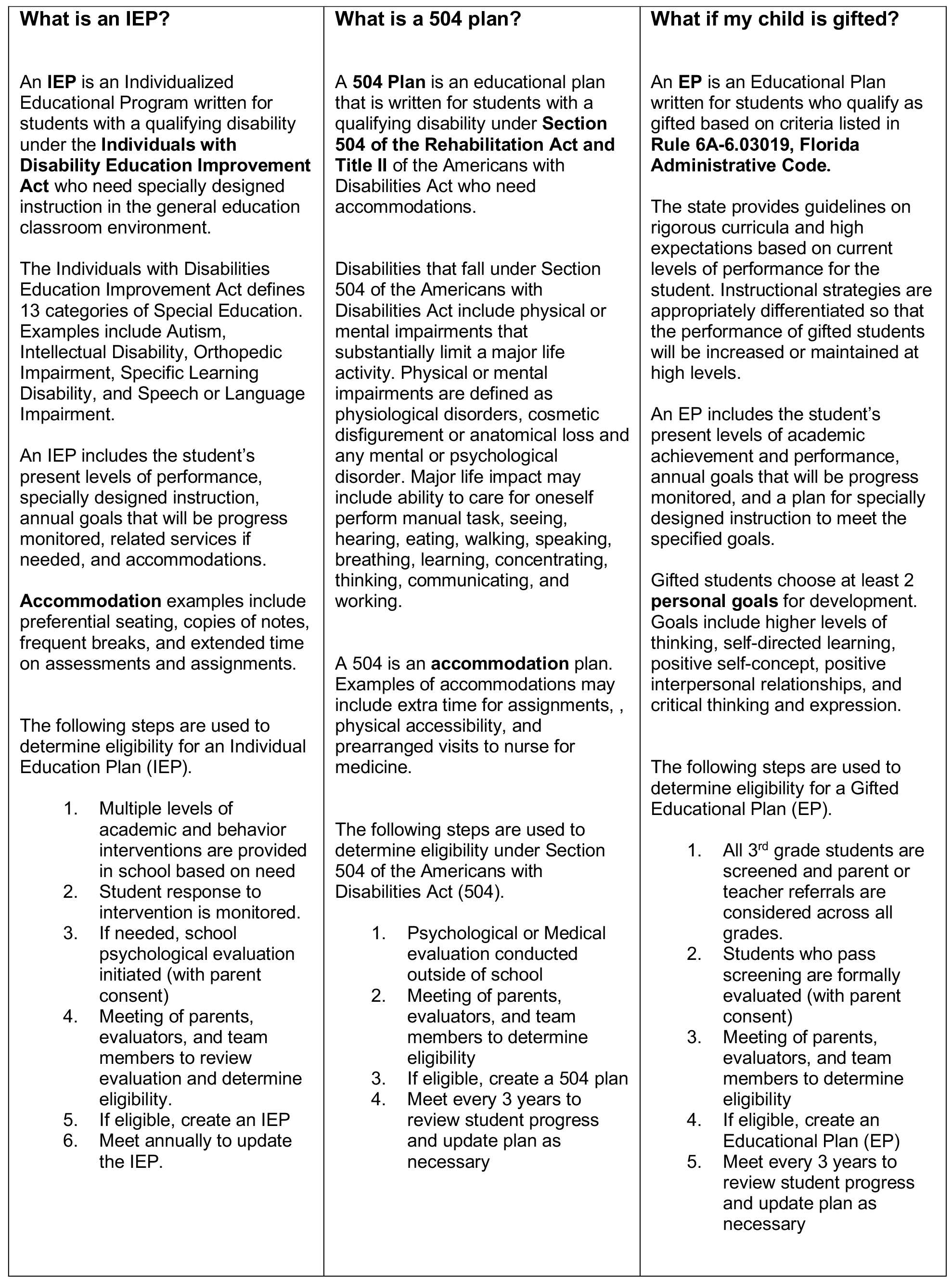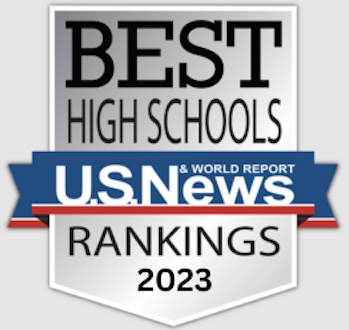IEP | 504 | Gifted
As a special school district, P.K. Yonge DRS is obligated to provide minor accommodations that enable its students who have IEPs or 504s to participate successfully in the core curriculum and core classroom. The students must also be able to qualify for a standard high school diploma upon the completion of high school. The P.K. Yonge Exceptional Student Education Plan, approved by the state of Florida, specifically addresses this policy.
For a printable overview of IEPs, 504s, and Gifted classifications: P.K. Yonge ESE IEP 504 Gifted Overview

The accommodations provided for students are generally in the form of extra support services which may include, but are not limited to the following: consultation with the core classroom teachers, small groups, tutoring, extended time for test taking, assignment modifications, taping of class lectures and/or discussions, modified test settings, dictation of written assignments, etc.
If it is determined that a student has needs greater than those which P. K. Yonge DRS can meet or which would limit participation in the core curriculum and/or the core classroom, that student is recommended for placement in his or her home school district, where the needs can be met. Any such student is given a leave of absence from P. K. Yonge and is readmitted to the school when his/her needs, as evidenced by their IEP, can be met with our limited resources.
As part of the application process to the school, student records, including IEPs, are examined to ensure that we are able to meet the needs of each student. Once signed, the IEP becomes a legal document, requiring the school and its teaching staff to implement accommodations indicated there, to monitor the progress of the student toward the annual goals at least as often as students who do not have IEPs or 504s and to report that progress, or lack thereof, to parents. If P. K. Yonge DRS is not able to provide the services needed, the student is denied admittance to the school. Families who intentionally falsify information on the application for admission in order to circumvent the review of IEPs will be required to withdraw their student from the school.
Referral Process
The school has Student Success Team (SST) meetings – a component of P.K. Yonge’s Multi-Tiered Systems of Support (MTSS), which review concerns from teachers, counselors, instructional support, school psychology, administration, MTSS Specialist, and learning community leaders about student progress.
The SST discusses and develops plans of action aimed at achieving optimal growth for the students. Both elementary and secondary SSTs meet several times in the fall, winter and spring to review teacher concerns and develop interventions intended to help the student be more successful.
- The first step in the referral process is for a classroom teacher or team of teachers to conduct at least one conference with the student’s parent(s) about the concerns prior to SSTs or shortly after. At these conferences the concerns are discussed and plans are made as to changes to be implemented that will assist the student in being more successful. This conference is documented and a copy of the conference notes is given to the learning community leader.
- If the concern continues after a reasonable amount of time has passed to observe the impact of the interventions (six weeks is standard practice), bring teacher(s) concerns back to the Student Success Team. Teachers should also speak with their learning community leader and/or the MTSS Specialist if they would like to discuss the student’s progress further.
- All the student’s teachers will be asked to provide input in order to describe the areas of concern in detail and to determine if there is a broad concern or if the concern is limited to one curricular area or one teacher.
- A classroom observation may be made by any member of the SST team in order to help identify the best support for the student.
- The team will review the information gathered and may set a time to meet with teachers, student’s parents, and possibly even the student to discuss the previous interventions and, perhaps to develop new ones.
- After six weeks to 27 weeks of consistent implementation of the interventions, the team may decide to a) continue the interventions, b) modify the interventions, c) halt the referral process or d) move forward with a full evaluation (educational and/or speech/language) completed by the school psychology department.
- Evaluation requires parent permission and must be conducted by the psychologist or the speech and language pathologist, or both. When completed, a reporting meeting is scheduled to share the information gathered with parents and teachers.
- If a student qualifies for a special education program, it is necessary to write an Individual Education Plan (IEP), which identifies the services to be provided in order to meet the student’s needs. A meeting is called with the parents, the Learning Community Leader, the district, which will be the MTSS Specialist or the Administrator of Academic Advisement and Counseling, a core teacher, the evaluator and, if appropriate, the student (required at age 14 and older). The IEP may be reviewed or rewritten at any time at the request of parents or school staff and must be updated annually.
Scope of Exceptional Student Education Program
Students who have IEP or 504s who qualify for the following programs and need only minor modifications are served at P.K. Yonge: Speech Impaired, Language Impaired, Hearing Impaired, Specific Learning Disabilities, Emotionally Handicapped, Other Health Impaired and Gifted.
The services to students are provided through an inclusion model incorporating consultation, collaboration, and co teaching, where students participate in the core with students who do not have IEPs or 504s. Learning Community Leaders and the MTSS Specialist serve as consultants, collaborators and/or co-teachers to classroom teachers to ensure that student needs are being met.
All teachers may meet with students in small groups and/or accommodations within the classroom patterns.
Under the consultation model used at our school, the Learning Community Leader must meet monthly with the core teachers to monitor implementation of the accommodations and the progress of each student. These meetings are logged as part of the record keeping requirements for the program.
Some Cautionary Notes
Teachers must be circumspect in conversations with parents, especially regarding what one believes to be the “problem” with the student’s lack of success. Placing a label on the issue, such as ADD or Specific Learning Disability, will immediately put the school in the position of labeling without evaluating. Recommendations for therapy of any kind – counseling, occupational therapy, speech, tutoring, medication, etc. immediately obligate the school to provide those services or to pay for them in the private sector. (If we are providing them, no problem is created. This is only a problem if we are not providing the service.)
Instead of labels or recommendations, report observable facts – “Sam is having difficulty completing his math work in class”. “The other students finish a full I5 minutes before he does”. “Some students have benefited from tutoring in similar situations. You may want to consider this as a possibility.” Do not say: “I recommend that you get a tutor for Sam so that he can improve his math scores.”
If the conversation with a parent moves toward identifying services and programs available to meet student needs, the teacher should refer the parent to a counselor or the Assistant Principal for Academic Advisement and School Counseling or the MTSS Specialist. A possible response would be “I’m not totally familiar with the procedures for making a referral” or “I ‘m not familiar with the total range of support available for students at our school. Here is the name and telephone number of a person who can answer your questions more completely.”




